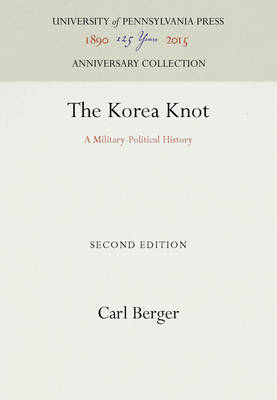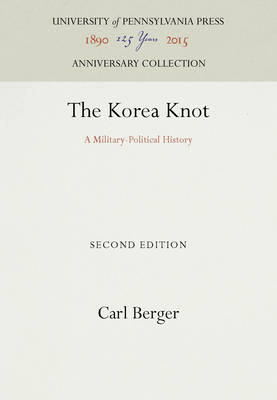
- Retrait gratuit dans votre magasin Club
- 7.000.000 titres dans notre catalogue
- Payer en toute sécurité
- Toujours un magasin près de chez vous
- Retrait gratuit dans votre magasin Club
- 7.000.000 titres dans notre catalogue
- Payer en toute sécurité
- Toujours un magasin près de chez vous
Description
Beginning with a brief account of the troubled historical past of this small country that had long known invasion and the threat of invasion, Carl Berger sets the stage for Korea's catastrophic hour resulting from World War II--the division of a once-united nation into two separate countries. It is this division, he maintains, that holds the key to the Korean tragedy.
The book ranges from the Cairo Pledge to the present, examining the shifts in international diplomacy, Russia's change in attitude after Yalta and the death of Roosevelt, the intransigence of the Communist occupiers of northern Korea after the defeat of Japan. Berger also vividly describes the Communist invasion of South Korea and the conviction of President Truman that led ot the united Nations action to meet the challenge under the leadership of the United States. The bitter warfare of the "police action," the worldwide shock at the Chinese "volunteer" army's sudden entry into North Korea, the recall of General MacArthur, the struggles to work out an armistice, President' Rhee's despairing attempts to force the unification of his country and his final downfall--the entire dramatic story is unfolded in sequence. Carefully documented, The Korea Knot is an objective and detailed study that makes an important contribution to our understanding of the dilemmas--of war and peace, of freedom and repression--that still face a divided world.Spécifications
Parties prenantes
- Auteur(s) :
- Editeur:
Contenu
- Nombre de pages :
- 256
- Langue:
- Anglais
- Collection :
Caractéristiques
- EAN:
- 9781512800432
- Date de parution :
- 29-01-68
- Format:
- Livre relié
- Format numérique:
- Genaaid
- Dimensions :
- 156 mm x 234 mm
- Poids :
- 535 g







